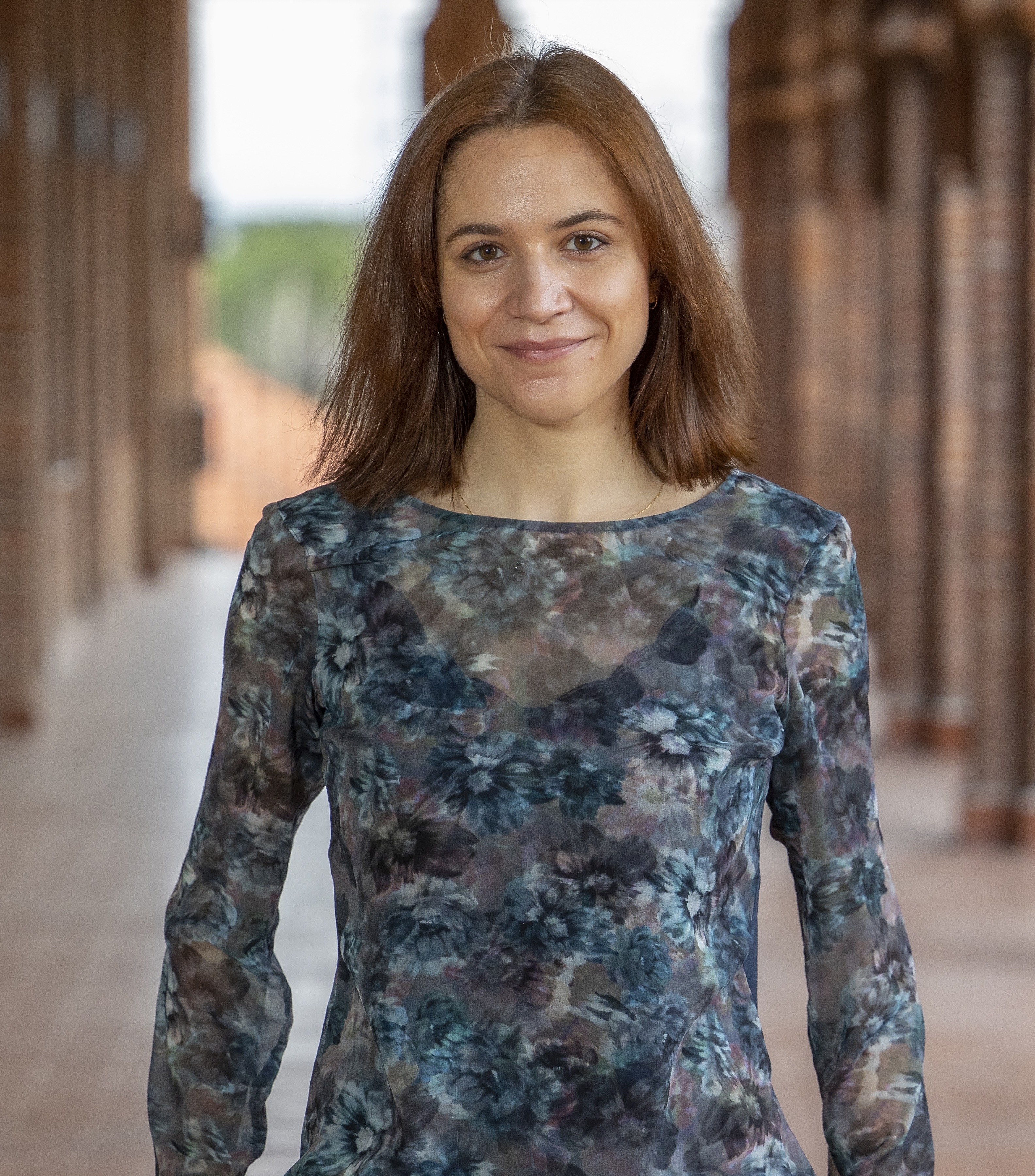Research Program. Precision Nutrition and obesity
Nutritional Control of the Epigenome
Group leader: Dr. Lidia Daimiel Ruiz
Objectives: This group aims to describe the epigenetic mechanisms modulated by diet and the impact of such modulation on cellular physiology. These are our main lines of research:
- The description of the effect of nutrients and dietary patterns on circulating microRNA profiles and cellular methylation marks: based on nutritional intervention trials, This research line aims to identify circulating microRNA profiles and DNA methylation marks with potential to be biomarkers of nutritional response. By clustering analysis according to the change in circulating levels of key microRNAs and methylation status, we aim to predict individual response to diet. With this knowledge as start line, we then study the mechanisms underlying the dietary mediated modification of microRNAs expression and methylation marks.
- The description of the effect of nutrients on macrophage physiology: macrophages are key players in atherosclerosis progression, endothelial function, cardiovascular health and aging. We base our studies on human nutritional intervention trials and macrophages derived from participant’s monocytes. We are devoted to clarify how different nutrients and dietary patterns
modulate macrophage function and to define the molecular mechanisms underlying the impact of diet on macrophage function. - Study of the effect of TMAO, a metabolite derived from red meat, on hepatic and macrophage physiology. TMAO (Trimethylamine N-Oxide) is a metabolite derived from choline, betaine and L-carnitine provided by seafood, red meat and eggs and has been related to cardiovascular disease and inflammation. We analyse the effect of TMAO on human hepatocytes and macrophages function using cell lines, organoids and primary cells.
Dr. Lidia Daimiel Ruiz
Postdoctoral researcher and Group Leader of the Nutritional Control of the Epigenome Group

Dr. Lidia Daimiel Ruiz graduated in Biology at Universidad Autónoma de Madrid where she carried out postgraduate studies about the genetic and epigenetics alterations associated with colorectal cancer onset and progression, under the supervision of Prof. Juan José González Aguilera and Prof. Mª Antonia Fernandez. She started her PhD in 2006 at Hospital Ramón y Cajal and was focused on the study of cholesterol-mediated gene regulation, under the supervision of Dr. Javier Martínez-Botas and Dr. Diego Gómez-Coronado. She joined IMDEA Food in 2011 as postdoctoral researcher to study the dietary modulation of microRNAs under the supervision of Dr. Alberto Dávalos and Prof. José Mª Ordovás. In
2015, she was promoted to Junior Investigation and started to build her own research group to study how diet modulate the epigenome with a focus on microRNAs and methylation marks. She specialized in human nutrition intervention trials and joined to the prestigious consortium PREDIMEDPLUS as Principal Investigator, where she conducts her epigenetic studies. In 2016, she stayed at Carlos Fernández- Hernando’s laboratory at Vascular Biology and Therapeutics program at Yale University for 6 months. She was recently promoted to Group Leader within the Precision Nutrition and Obesity Program directed by Prof. José Mª Ordovás. Along her career, she has published her results in international peer-review journals of the first quartile and high impact. She is also actively participating in communication and education programs within the frame of EIT-Food and IMDEA Food.
Mail: lidia.daimiel@imdea.org
Tlf. + 34 91 727 81 00 . ext 309
Members
Laura Díez Ricote
Predoctoral researcher
 Laura Díez Ricote started her undergraduate studies in Biology at the Autónoma University of Madrid, where she specialized in Food Science and obtained her degree in 2013. Later on she completed an internship at APPLUS Agrifood. In 2014, she was awarded with a scholarship from the Autónoma University of Madrid, where she completed a Master of Science in Agricultural Chemistry and Novel Foods (2015) and presented her final project ”TMAO effect in microRNAs expression related to cardiovascular disease and inflammation” which she carried on at IMDEA Food in the Nutritional Genomics and Epigenomics group. In 2015, she was awarded with a Fulbright Fellowship to pursue a Master of Science in Food Science and Human Nutrition from the University of Florida (2017), focusing on molecular nutrition, where she presented her final project “Iron-related proteins and their regulation by renal iron overload”. In May 2017 she was invited to give an oral presentation at the BioIron Meeting, held in Los Angeles, about her master thesis. In March 2018 she joined IMDEA Food Institute’s in the Nutritional Genomics and Epigenomics group, where she started her doctoral studies the effect of caloric restriction on epigenetic mechanism and their influence on cardiovascular health and healthy aging .
Laura Díez Ricote started her undergraduate studies in Biology at the Autónoma University of Madrid, where she specialized in Food Science and obtained her degree in 2013. Later on she completed an internship at APPLUS Agrifood. In 2014, she was awarded with a scholarship from the Autónoma University of Madrid, where she completed a Master of Science in Agricultural Chemistry and Novel Foods (2015) and presented her final project ”TMAO effect in microRNAs expression related to cardiovascular disease and inflammation” which she carried on at IMDEA Food in the Nutritional Genomics and Epigenomics group. In 2015, she was awarded with a Fulbright Fellowship to pursue a Master of Science in Food Science and Human Nutrition from the University of Florida (2017), focusing on molecular nutrition, where she presented her final project “Iron-related proteins and their regulation by renal iron overload”. In May 2017 she was invited to give an oral presentation at the BioIron Meeting, held in Los Angeles, about her master thesis. In March 2018 she joined IMDEA Food Institute’s in the Nutritional Genomics and Epigenomics group, where she started her doctoral studies the effect of caloric restriction on epigenetic mechanism and their influence on cardiovascular health and healthy aging .
Mail: laura.diez@imdea.org
Tlf. + 34 91 727 81 00
Esther Cuadrado Soto
Postdoctoral researcher
 Dr. Esther Cuadrado Soto was graduated in Pharmacy (2013) and she completed a Master in Pharmaceutical Sciences (2014), both at the Complutense University of Madrid. Her PhD focused on dietary sources and sodium intake in children (Complutense University of Madrid, 2019) under the supervision of Prof. Ana María López Sobaler and Prof. Aránzazu Aparicio Vizuete. During her PhD, she did a three-month visiting internship at the Department of Nutrition and Food Sciences at the University of Rhode Island (USA). Later on she received the second prize from the ‘Fundación Rafael Folch’ for ‘Other Doctoral Awards for the 2018/2019 academic year’ at the Complutense University of Madrid. She has published some of her results in international peer-review journals of the first quartile. In July 2020, she joined IMDEA Food Institute in the Nutritional control of the epigenome group – NUCONEP group, where she is working as a Postdoctoral researcher and a collaborator on the study Predimed plus ‘Effect of an energy-restricted Mediterranean diet, physical activity and behavioral intervention on the primary prevention of cardiovascular disease’. She has received funding from the European Social Fund and Comunidad de Madrid (Ref: PEJD-2019-POST/SAL-15164).
Dr. Esther Cuadrado Soto was graduated in Pharmacy (2013) and she completed a Master in Pharmaceutical Sciences (2014), both at the Complutense University of Madrid. Her PhD focused on dietary sources and sodium intake in children (Complutense University of Madrid, 2019) under the supervision of Prof. Ana María López Sobaler and Prof. Aránzazu Aparicio Vizuete. During her PhD, she did a three-month visiting internship at the Department of Nutrition and Food Sciences at the University of Rhode Island (USA). Later on she received the second prize from the ‘Fundación Rafael Folch’ for ‘Other Doctoral Awards for the 2018/2019 academic year’ at the Complutense University of Madrid. She has published some of her results in international peer-review journals of the first quartile. In July 2020, she joined IMDEA Food Institute in the Nutritional control of the epigenome group – NUCONEP group, where she is working as a Postdoctoral researcher and a collaborator on the study Predimed plus ‘Effect of an energy-restricted Mediterranean diet, physical activity and behavioral intervention on the primary prevention of cardiovascular disease’. She has received funding from the European Social Fund and Comunidad de Madrid (Ref: PEJD-2019-POST/SAL-15164).
Mail: esther.cuadrado@imdea.org
Tlf. + 34 91 727 81 00
Beatriz Martínez
Laboratory Technician
Beatriz Martínez Blanco holds the degree in Superior Laboratory Technician since 2006. She obtained the certificate for New Therapeutics Drugs Discovery applying High Throughput Screening technique by University Juan Carlos I (Madrid, Spain). She worked as Quality Supervisor at Lilly S.A. from 2007-2009 and as Lab Manager at Fundación Parque Científico de Madrid under the supervision of D. Antonio Díaz and D. Alejandro Arranz. In 2016, she worked as Laboratory Technician in the Department of Microbiology at Centre for Molecular Biology – Severo Ochoa (Madrid, Spain), under the supervision of Dr. Mercedes Dávila. In 2017, she worked in the Department of Research for New Drugs at ROVI until her joining to IMDEA Food in 2017, where she worked as Laboratory Technician of GENYAL Platform of Nutritional Genomics. She joined Precision Nutrition and Obesity Program, headed by Prof. José Mª Ordovás, at IMDEA Food in 2021 as Lab Manager of the research program. Along her professional career, she has gained experience in multiple laboratory techniques and standard operating procedures.
Mail: beatriz.martinez@imdea.org
Students
María Tanarro García
Cristina Jaén Calvo
María Díaz Cortés
Vicent Peeters
Ana Sánchez Randulfe
Alba Cano Bustos
Cielo García Montero
Guillermo Delgado Muro
Victor Díaz Barrios
| most relevant publications |
|
| main research grants |
|
Principal Investigator: Guillermo Reglero (coordinador) / Lidia Daimiel Ruiz (IP de grupo) ___________ Participant Investigator: David Reher ___________ Participant Investigator: Lidia Daimiel Ruiz ___________ Participant Investigator: Jordana Bell (coordinadora) / José Mª Ordovás (IP de grupo) ___________ Principal Investigator: David Jiménez Pavón |

